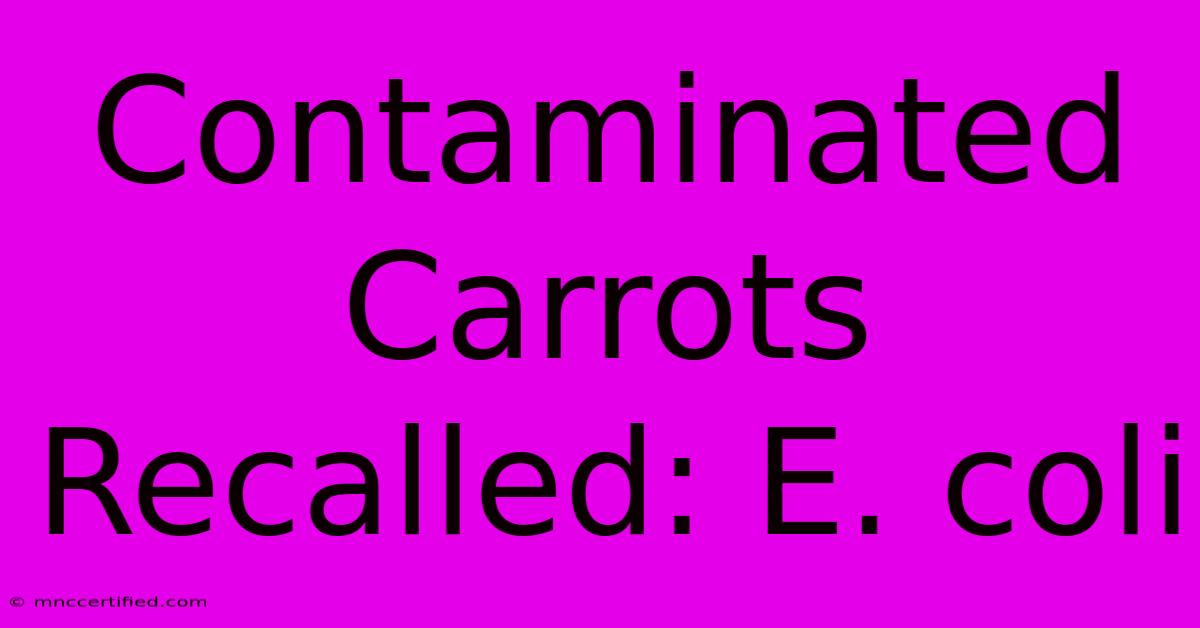Contaminated Carrots Recalled: E. Coli

Table of Contents
Contaminated Carrots Recalled: E. coli Outbreak Investigation
A recent recall of contaminated carrots highlights the importance of food safety and the potential dangers of E. coli contamination. This article delves into the details of the recall, explains the risks associated with E. coli, and provides essential information on how to protect yourself and your family.
Understanding the E. coli Threat
Escherichia coli (E. coli) is a type of bacteria commonly found in the intestines of humans and animals. While most strains are harmless, some, like E. coli O157:H7, can cause serious illness. This particular strain produces a potent toxin that can lead to severe symptoms.
Symptoms of E. coli Infection
Symptoms of E. coli infection can vary, but often include:
- Diarrhea (often bloody): This is a key indicator of E. coli infection.
- Severe stomach cramps: Painful abdominal cramping is common.
- Vomiting: This can lead to dehydration.
- Fever: While not always present, a fever can indicate a more severe infection.
Severe cases can lead to:
- Hemolytic uremic syndrome (HUS): A life-threatening complication affecting the kidneys.
- Thrombotic thrombocytopenic purpura (TTP): Another serious complication involving blood clots.
If you experience these symptoms after consuming carrots or other potentially contaminated produce, seek immediate medical attention.
The Carrot Recall: What Happened?
[Insert details about the specific carrot recall here, including:]
- The brand name(s) of the affected carrots. Be precise and include any specific product codes or lot numbers.
- The distribution area: Specify the regions where the recalled carrots were sold.
- The reason for the recall: Clearly state why the carrots were recalled (e.g., E. coli contamination detected during testing).
- The date of the recall announcement: Provide the official date the recall was announced.
- The recall agency: Mention the agency responsible for issuing the recall (e.g., the FDA).
[Note: Replace bracketed information with accurate, up-to-date details from official sources like the FDA website.]
How to Check if Your Carrots Are Recalled
Carefully examine the packaging of any carrots you have purchased. Check the lot number and best-by date against the information provided in the official recall announcement. Do not consume any carrots that match the description of the recalled products.
Preventing E. coli Contamination
Preventing E. coli contamination requires careful practices throughout the food handling process:
- Thorough washing: Wash all produce, including carrots, thoroughly under running water before eating, even if you plan to peel them.
- Proper cooking: Cooking carrots to an internal temperature of 165°F (74°C) will kill E. coli bacteria.
- Hand hygiene: Wash your hands thoroughly with soap and water before and after handling food.
- Safe food storage: Refrigerate perishable foods promptly and properly.
- Separate raw and cooked foods: Avoid cross-contamination by using separate cutting boards and utensils for raw and cooked foods.
What to Do if You Have Recalled Carrots
If you have purchased carrots that are part of the recall:
- Do not eat them.
- Discard the carrots immediately. Properly dispose of them in a sealed bag to prevent contamination.
- Contact the retailer: If you purchased the carrots from a store, contact them to inquire about a refund or replacement.
- Monitor your health: Watch for symptoms of E. coli infection and seek medical attention if necessary.
This article aims to provide crucial information regarding the recalled contaminated carrots and the dangers of E.coli. Always refer to official sources for the most up-to-date information on recalls and food safety guidelines. Your health is paramount; prioritize safe food handling practices.
Keywords: E. coli, carrot recall, food safety, food poisoning, contaminated carrots, bacteria, diarrhea, stomach cramps, vomiting, HUS, TTP, FDA recall, foodborne illness, food safety tips, recall information, health alert.
(Note: This article is for informational purposes only and does not constitute medical advice. Always consult a healthcare professional for any health concerns.)

Thank you for visiting our website wich cover about Contaminated Carrots Recalled: E. Coli. We hope the information provided has been useful to you. Feel free to contact us if you have any questions or need further assistance. See you next time and dont miss to bookmark.
Featured Posts
-
Live Stream Croatia Vs Portugal Uefa Nations
Nov 19, 2024
-
Can You Sue Car Insurance Company
Nov 19, 2024
-
Jinping Supports Starmers Policy
Nov 19, 2024
-
Carsley Passes Coaching Baton To England
Nov 19, 2024
-
Daniel Jones Benched Tommy Starts
Nov 19, 2024